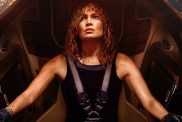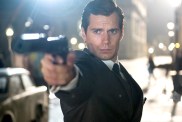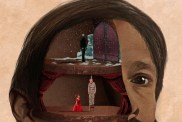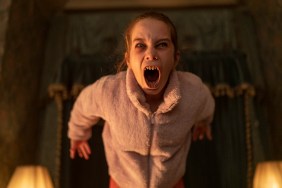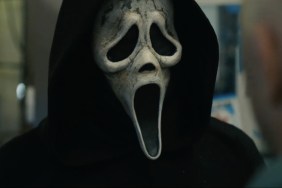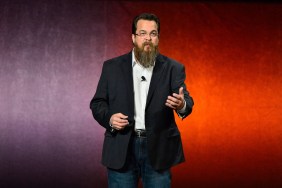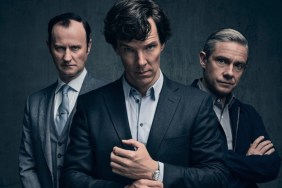
SHOCK hit the 10 CLOVERFIELD LANE press conference in NYC.
This years true sleeper hit is the sneak-up-on-you claustrophobic, low-budget sci-fi/horror thriller 10 CLOVERFIELD LANE. With first-time helmer Dan Trachtenberg guiding the talents of John Goodman and Mary Elizabeth Winstead, with a tight script from Matthew Stuecken and Josh Campbell, and a rousing score from Bear McCreary, the film takes audiences on a roller-coaster ride with a strong team firmly handling the controls.
In New York for a press conference, these talents took questions during a round-table press conference, giving up as much as they could under the tight secrecy enveloping the film. No outright spoilers here, and keep your ears and eyes covered until you can see this cat, mouse, and BLANK game for yourself!
What inspired this idea? Which one of you built the bunker?
Matt: It actually started where I just had this opening scene for this idea in my head. Josh and I were working separately at that point. I pitched him the idea of that opening scene. He liked it so much that we decided to collaborate on it. It was the first project we had done together. And less than two months after we started writing it was when Bad Robot and Paramount decided to acquire the screenplay. We were so excited. You just cant do better than that.
Mr. Trachtenberg, this is your first film. You used to be on the other side of this. Whats it like being on the other side. And now youre the director. Is it scary, is it exciting?
Dan: Its both of those things, all the time. It was very exciting making the movie. Its something Ive wanted to do all my life, since I was three years old making movies with action figures and with my best friends in my backyard. I loved movies that moved me physically. I loved it when my heart would race, and my palms would sweat. To make something this exciting and to really try to move people to the edge of their seats, or back in them, was an absolute thrill. I couldnt have been more lucky to make it.
Mr. Goodman, youve been a part of some great ensembles. Theres only three people, essentially, in this film. Is it more rewarding as an actor to be with only three people?
John: You have more lines [laughter]. The flip side is that you have more lines to memorize. And at my advance age John and Mary Elizabeth were patient with me. And I had an excellent director.
Mary: When youre lucky enough to have John Goodman and John Gallagher, Jr. its the best opportunity ever. I just got to kind of sit through a master class of acting just getting to sit opposite them every day. I couldntve been luckier. It depends on the actors and I lucked out on this one
Were you guys concerned all selling a screenplay that only three had parts to it?
Matt: We through there was a real market for small contained thrillers that maybe have really big ideas. I think thats the same thing that J.J. and Paramount saw in it. We sat down to write something that we thought was very make-able. We knew Bad Robot was the perfect home for it, but we didnt dare to dream that high while we were doing it.
Dan: But one of the parts is also the best special effect in the movie. Mary gives a largely non-verbal performance yet you always feel like you know everything that shes thinking and feel everything that shes feeling and thats something is very unique in this genre.
Lets talk about that character Michelle. Shes kind of a badass. What was your favorite thing about her?
Mary: What I loved most about her is that shes kind of a badass from the beginning. I think in reading roles I generally see a lot of female roles being that if theyre badass they have to be kind of weak in the beginning in order to grow to find their strength and something happens to them that makes them find it and they persevere on. But with her she was smart and strong and capable from the get-go as I think a lot of women are. So it was cool to see that play out. As soon as she gets there shes active and shes thinking about her next tactic, her next movie. And theres not a second of the movie where shes passive. Or where shes not trying to figure this thing out so it was really exciting to play someone whose brain never stops working for the entire film.
Howard is such a tricky character for the whole movie we cant really figure out who this character is. Is he looney tunes?
John: You think? [laughter] I have to trust the audience that theyre gonna see my inner screw loose. Theyre gonna see the loose wiring after awhile. He comes at it from his own particular point of view. Which happens to be looney tunes. But its also nice to have somebody thatll stab you with a jagged piece of wood one moment and sew you up the next. Hes got his own perspective on things, and hes always right. Which never ends well for anybody.

Were presented with you Mary and John right there without any sort of backdrop. Shes leaving her boyfriend. Johns in this survivalist cellar. How did you approach your characters? Did you fill out whole histories for them? I read that everything was very secretive and you only got updates or revisions slowly.
Mary: It was a very collaborative experience in terms of the backstory of the character Michelle at least. Theres a scene in the movie where she talks a lot about what shes gone through or regrets that shes had and that was something that was collaborated on as we were working because we want it to feel very natural to who I am and what I was bringing to Michelle. So that changed as we were working. Who is she? Where is she coming from? And whats her story? But I love that the audience never fully knows her story. I love that as an actor I get to have that bubbling under the surface without it being verbally explained. That way the audience can come to their own conclusions about who she is to them. And make judgments based on her actions in the film and how brilliant and resourceful and clever she is as opposed to having all this exposition about who she is on paper.
John: I would invent stuff day to day the more we went into the film and kept it to myself. Its pretty screwy up in my head. We just did play stuff. Thats what we did was play. Because it couldve gotten intense on the set really quickly and it wasnt. It was loose and fun. I just write my own backstory and then forget about it.
This is probably the most secret film youve all been a part of. What was that like?
John: We would get the rewrites written on toilet paper in urine. Theyd slowly come to light in the microwave. The unfortunate thing was when we needed to eat the script.
Dan: You werent supposed to talk about that!
John: Ive broken the confidentiality agreement. I will now be part of the waterfront. Around 65th street if you want to visit.
Dan: Its very much J.J.s thing. It was something I had hoped would come to fruition in terms of the marketing and the trailer by not giving much away as the movie itself is full of secrets and surprised. I think now people are able engage with the movie the way it was designed. It was so exciting to hearken back to a time when we learned about a movie from its trailer. I remember vividly going to the movies to see Dave, that awesome Kevin Kline presidential movie, and the trailer for Jurassic Park played and I thought What is that movie! That looks so awesome! and to recapture that and this thing where the movie comes out two months after the trailer drops is just very exciting and very necessary for a movie like this.
At what point in writing the film did you decide you would be writing a sequel to CLOVERFIELD?
Matt: We wrote an original screenplay. It was not meant to be a sequel at the time. Cloverfield wasnt in our minds when we wrote it. During the development process the idea came up it could be in a Cloververse. Honestly when when we first started thinking about it, we were a bit surprised. But the more you think about it, and I think people who see the movie will see it makes sense in terms of tone and twists and turns and thriller aspect. We got really excited because we knew that it was the right choice to make.
Youve been playing some pretty angry characters. Whats it like playing such an angry character.
John: I dont have to act. [laughter] I dont seem so much of a comparison between Frank King and Howard. They occupy the same unfortunate body. Its just a facet of human nature.
Dan: I think he cool thing about his menacing role in this movie is I think its so much more intense because hes funny at times. And because hes so lovable by nature. Youre not only scared by him, you also really enjoy being scared by him, which is something very unique to John.
Were you nervous about working with a first-time director?
John: It takes a few days to get acquainted with a new director. Im always nervous at the beginning of a film. I didnt know he was a first-time director and I wouldnt have guessed it. Because he was very confident in what he wanted. He was very helpful with his direction. Ive got tunnel vision and I only see this far in front of my face when Im working. Hes remind me of things I needed to know. I didnt know it was his first job.
Mary: I would agree. I dont think I ever noticed it. He never seemed nervous or worried. He always seemed so confident. He was incredibly relaxed. For me as well in this script. I loved the way that Michelle was written but in terms of playing a lead role in a horror film the execution of that is really important so it was really important for me to meet Dan and talked about how he perceived that in the portrayal of her. I could tell he was looking at it from the inside of Michelles shoes as opposed to watching her from the outside. And to me that made all the difference for feeling total confidence for of how he was going to handle this from my perspective.
That initial car accident really pulls us right into the movie.
Dan: Its funny that car accident was conceptually very different when we were shooting. It was very gimmicky. It was going to be one long take. We shot some stuff on a gimble on a soundstage and JJ who loves doing things very homespun and was a real champion of making it feel even more intimate and from Michelles perspective. He said, Honestly if we just go on a soundstage and shake the camera against a bluescreen, it will look even better than it being on a gimble. And I think the worst shot in that sequence is our only gimble shot. And once again the best special effect is Mary. It was very easy to shake the camera but Mary flinging herself all over the place is what works in that scene.
Mary: It got me a nice massage.
Dan: Its a pretty intense sequence amplified by all the awesome sound design.

Could you tell us what was going through your head the first time you read the script?
John: Just another day at home. [laughter] It was different. Thats the first thing that hit me. It was different than anything Id read before. It was a page-turner which is always a good sign. Like reading a good book. You want to see whats gonna happen next. That was the very first impression I got.
Mary: I didnt expect the turns to happen whatsoever and I certainly didnt know where it was going or where it was leading. And selfishly as an actor I wanted to go on this ride as this character. Really seemed like a lot of fun stuff. I thought it was really refreshing in terms of the genre as well.
How does it feel being in a movie that scares the crap out of people?
Mary: I love it! Its kind of weird because it wasnt a really scary experience making the movie. It was quite pleasant. So theres something kind of odd ultimately that is what we want. Thats what we were trying to accomplish all those days we were hanging out having a good time.
John: Its nice to have any effect on an audience besides making them yawn or check their phones. If weve accomplished that weve done our humble job.
What are some of the major markers on your way to becoming a film director from a podcaster?
Dan: Even when I hosted that internet show I also was directing commercials. And a lot of the commercials were very slice of life and emotional and documentary style but not big and cinematic and ultimately like the movie I wanted to make. So at one point I decided to do this short film based on the videogame Portal that really struck a nerve and caught a lot of peoples attention and that opened some doors into making movies. And then I started developing stuff on my own and this script came my way and I said emphatically, Yes! Absolutely.
I’m wondering, how challenging was it to find levity amongst all the intensity? And what do you think is so appealing to that dark theme?
Matt: I think in any movie like this, you need to give the audience a break. If they’re just feeling like something bad’s going to happen every single minute of the film, it becomes too much and you become numbed by it. We’re so lucky to have such a confident first-time director, and such great performances that you … you’re in this bunker for so long, but you want to be there because they’re just such engaging people, and I think that’s a testament to the work the actors and the director did.
Josh: I think, to be fair, also the actors found stuff that we didn’t always necessarily see in some of the lines, which really elevated them beyond anything we had hoped.
John: … and they have a really cool jukebox.
Dan: In terms of the dark themes thing, there’s two awesome quotes from Wes Craven that were very inspirational to me for my whole life, but specifically for this movie. One was that ‘Horror movies are boot camp for the soul’ and that ‘Horror movies don’t create fear, they release fear.’ The thing about that for me, and especially this movie, is that it’s very much about the fear of the unknown. So much in life is very overwhelming because we don’t know how things are going to turn out, and to be able to see a movie that really puts you through the paces and you have this very intense, exciting experience that you know you will come out the other side of victorious, is very useful to us to sort of cathartically release those fears through. I think that’s always going to be attractive to people, to be able to release all that tension that you can get overwhelmed by in life.
John: Kind of like getting on the number 6 train in the morning.
How did you envision the character that John Goodman ends up playing? Did you always have somebody in mind for the role and what did you think it would take to play that character? Actors who are known for comedy are able to make the transition to serious roles, and even win Oscars, but it’s not so easy for a serious actor to make the transition to comedy. Why do you think that is?
Matt: Well, the drive of the screenplay, the drive of the story was ‘Where does the truth lie?’ ‘Who’s telling the truth?’ So the character had to be all different things. He had to be terrifying at one moment, but then he had to be comforting the next. He had to be true too, he had to be authentic, so it was a real tough balance, and, again, I couldn’t imagine anyone doing it better because John does have such intensity and at the same time that levity, and he just brings it all, so it was great.
John: And a great character.
Dan: I think your question points out why John Goodman’s such a perfect person for the role, because you wouldn’t want a straight comedian and you wouldn’t want a straight, dramatic actor for that role, you need someone that can walk both sides of that line. We were so fortunate.
John: I don’t know. George Scott and Gene Hackman both make me laugh a lot. It’s just a matter of knowing style, timing, and a sense of where you are, and release.
I was wondering if there are any movies that influenced you when it came to tone and environment?
Dan: Sure. I drew a lot from ‘Rosemary’s Baby.’ I’m a big Hitchcock fan and ‘Notorious’ is one of my favorite Hitchcock movies, and that has a great sequence with a set of keys, and we have a very cool sequence with a set of keys in our movie. I looked a lot at sub movies. I looked at ‘Hunt For Red October’ and ‘Crimson Tide, because those are also very contained movies that feel really big.
I think, also, it was really important for us to play with genre expectations. I think people think when see a trailer that they know what the movie is. Nowadays, audiences are really savvy towards entertainment, and we did our best to zig when people expected us to zag as much as possible in the plot and with the characters. We pulled on a lot of different influences as a result, because we did not want to go down the same road that other people had previously.
We’ve established now that CLOVERFIELD and 10 CLOVERFIELD LANE do not exist in the same continuity. Is that correct?
Dan: Yeah, theyre definitely not in the same timeline though overall, it’s definitely a question for J.J., and not me, but I think that the cool thing about this movie in and of itself, is that it feels like there could be a sequel and it would be awesome to make a direct sequel to just this movie, but it’s also kind of badass if there weren’t. If this were its own standalone thing, and the character goes through the journey that she goes through, and if that were it, that’s so kind of cool to leave to your imagination what she could tackle next.
Tell me a little bit about working with the composer and getting the feel you wanted.
Dan: I’m a huge fan of Bear McCreary’s so being able to geek out with him about film scores throughout the entire experience was amazing. Bernard Hermann was a reference point for me even before we shot the movie, and it’s something that Bear was really excited to do to evoke that composer and that kind of music, and to create that feel right from the get-go. Theres even a little Jerry Goldsmith in there.

Was Mr. Goodman’s take on Santa Claus in the original screenplay? Was that directorial? Or does Mr. Goodman actually hate Santa Claus?
Dan: That actually evolved while we were shooting the movie. I think we started thinking “Wouldn’t it be great to have …” They mention ‘Monopoly’ in the movie, and we thought “Wouldn’t it be cool to have a scene where they’re playing a game with one another, but it takes a terrifying turn.” I did not think John’s performance would end up nearly as good as it did in that scene.
Mary and John Gallagher’s reactions to him are hilarious, and possibly too authentic. They were really reacting from the humor and the intensity that John was throwing down. It was pretty great.
John: They killed me before I could get out the hand puppets.
Was it ever difficult to step out of your characters during really intensive scenes, considering how psychologically distraught the characters were?
Mary: We were shooting so fast that I don’t remember there being all that much downtime. We had some here and there, but I felt like we were kind of in it. In the moments we did have, it was very relaxed and lovely.
John: Just from my perspective, it was like the three of us were playing, and we were having a really good time, but if I had taken that guy home with me, my wife would have put me out on Coliseum Street, except that Howard probably cleans the dishes really well, so she would have let me do the laundry and dishes first before she put me out. But there’s not any part of that guy I’d have wanted to take home with me.
